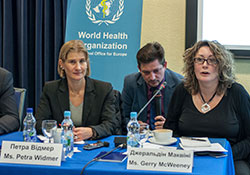WHO marks local launch of project to strengthen the noncommunicable disease response in Ukraine

WHO/K. Vozniuk
WHO launched the noncommunicable disease (NCD) prevention and health promotion project at local level in Ukraine on 28 October 2015, with support from the Ukrainian Ministry of Health and Ministry of Education and Science. The Deputy Director of the Swiss Cooperation Office in Ukraine, Petra Widmer, and the Deputy Minister of Health of Ukraine, Ihor Perehinets, attended, with representatives of the local authority. The scope of the project was presented.
NCDs account for 86% of deaths in Ukraine annually, and WHO is working with its partners to design an adequate response. "Setting up NCD-related policies and strategies is one of the top priorities for the Ministry of Health, as we continue to lobby for adoption of the overarching national NCD action plan", said Mr Perehinets. He emphasized the importance of early prevention: "One of the most important aspects of this plan is to strengthen primary care and therefore the early prevention of these diseases".
The project will be implemented in six regions of Ukraine: Dnipropretrovsk, Poltava, Vinnitsa, Lviv, Ivano-Frankivsk, Kharkiv and Kiev city. Gerry McWeeney commented: "Through this project we will support the Government to set up health policies to curb the NCD epidemic, and at the same time work with people and local communities to prevent the occurrence of NCDs". Ms McWeeney called for more effective engagement of civil society and the private sector.
An important aspect of the project is to create awareness on NCDs and their risk factors: tobacco use, alcohol consumption, physical inactivity and unhealthy diets. Other planned activities include setting tailored health strategies and policies, updating diagnosis and treatment protocols and building the capacity of primary health care professionals. The aim of the project is to involve communities and individuals in changing the social, behavioural and environmental conditions that affect peoples' health. Emphasis will be placed on early prevention and providing information in schools, as unhealthy behaviour often starts in adolescence.



